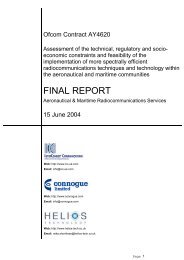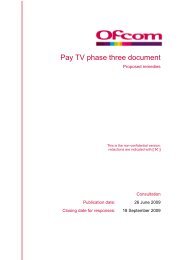QVC - Stakeholders - Ofcom
QVC - Stakeholders - Ofcom
QVC - Stakeholders - Ofcom
Create successful ePaper yourself
Turn your PDF publications into a flip-book with our unique Google optimized e-Paper software.
“direct offers broadcast to the public with a view to the supply of goods or<br />
services, including immovable property, rights and obligations, in return for<br />
payment”<br />
While we note that Participation TV could technically fit within this definition<br />
we would point out that teleshopping could also technically fit within the<br />
definition of television advertising given within the same directive; it is clear,<br />
however, that due to the distinct differences between traditional television<br />
advertising and teleshopping, there is a need to separate the two to ensure<br />
that they are correctly regulated.<br />
We consider the same is true of teleshopping and Participation TV. If the two<br />
are not clearly defined at this stage, problems could arise in regulating them<br />
effectively.<br />
3. THE PROPOSED SCOPE OF THE FORMAL CONSULTATION<br />
(QUESTION 2)<br />
<strong>QVC</strong> are satisfied with OFCOM’s proposed scope of the consultation; namely<br />
that it will cover television services that rely wholly or mainly on viewers<br />
paying for an opportunity to participate in the service. We agree that the<br />
means of participation be widened beyond premium rate telephony to<br />
encompass new payment methods.<br />
We also agree that, where it is clear that PRS contributes to the editorial<br />
content of the programme, it should not be included in the scope of the 2007<br />
consultation. We would suggest, however, that safeguards are introduced to<br />
ensure this provision is not used as a loophole by Participation TV services to<br />
circumnavigate the new regulatory system that results from the consultation.<br />
4. POSSIBLE REGULATORY APPROACHES (QUESTION 4)<br />
<strong>QVC</strong> considers that options A and B represent the only viable regulatory<br />
approaches.<br />
We consider that Option C would encourage Participation TV services to<br />
amend their services to ensure they fell within either editorial or advertising,<br />
depending on which regulations were more favourable. Furthermore, it would<br />
add an extra burden to the regulator having to decide in which category a<br />
Participation TV service fell in and extend the amount of time it takes for the<br />
regulator to stop practices that are in breach of their code.<br />
We do not understand how Option D could work in harmony with the<br />
separation principle. Furthermore, as with Option C, we consider Option D<br />
would cause an extra regulatory burden and would cause confusion as to<br />
which regulator should be taking action; it could also lead to inconsistency in<br />
decisions between regulators. It would also dilute the ASA’s “one stop shop”

















